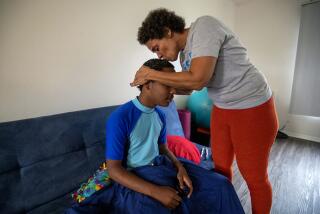Parents Searching for a Safety Net : O.C. mothers and fathers of mentally ill adults learn about a program that would enable them to set up trust funds and hire ‘proxy parents.’
- Share via
LaVern Fitzpatrick wishes that her son, David, who just turned 40, would move out and get an apartment of his own. Just for a while. Just so that he--and his parents--would know he could make it on his own if he had to.
But David, who has always lived with his parents, gets panicky whenever his mother brings up the idea of looking for an apartment.
Fitzpatrick says that her son, who has suffers from schizophrenia, would be content to stay where he is forever. But someday he will probably be alone, and she is terrified that if he doesn’t learn to be more independent now, he will end up on the streets, get sick and die in misery.
Such fears drew Fitzpatrick and about 50 others to a recent talk in Tustin that addressed one of the biggest concerns facing parents of the mentally ill: How will their adult children survive when they’re no longer around to watch out for them?
During the monthly educational meeting of the Alliance for the Mentally Ill of Orange County, they learned about a new program that would enable them to set up trust funds and hire “proxy parents” who would check on their loved ones at least once a week to make sure their basic needs are being met.
John Siegel, executive director of the nonprofit Proxy Parent Services Foundation, said he is starting to sign up families in Los Angeles County. (A $1,000 enrollment fee is required, and the weekly visits from proxy parents cost, at most, $225 a month. For more information, call (213) 413-1130).
If the program gets off the ground there, it will eventually come to Orange County, Siegel said, noting that he hopes to set up a statewide network of proxy parents through mental health agencies.
Siegel fielded a number of questions from his audience, a group of mostly older people whose grown children suffer from one of the three most common types of serious mental illness: schizophrenia, manic depression or severe depression.
Like Fitzpatrick, many parents worry about the future because no one else in their family could--or would be willing to--take care of their mentally ill child at home.
But even those whose children live in board-and-care facilities, hospitals or on their own worry about what will happen when they can no longer protect them.
Eldon Baber, executive director of the Tustin-based Alliance for the Mentally Ill of Orange County, said that when the mentally ill lose family members who have kept them out of the social service system, they become dependent on a bureaucracy so complex it could easily defeat a healthy person.
He said many parents fear that, if their children have no one to look out for them, they will end up in mental institutions--or among the estimated 50% to 66% of the homeless who are mentally ill.
These people need a “safety net,” which Baber hopes the proxy parent program will eventually provide.
But Fitzpatrick’s reaction to the program was reserved. It may help those who can afford it, the 62-year-old Anaheim resident acknowledges, but she doubts that any proxy parent would have the patience and the staying power that loved ones bring to the care of the mentally ill.
Her son’s special needs have been the focus of her life since he was a toddler. David didn’t start walking until he was almost 2. At age 5, he still couldn’t say such simple words as “mom” or speak in complete sentences--and still wasn’t toilet trained.
Fitzpatrick tried to get him into kindergarten, but two schools kicked him out in less than a week because he wasn’t able to sit still or follow directions--and because he was scratching and biting the other children.
Fitzpatrick finally found a private school that would admit her son, but she still didn’t know what was wrong with him. One doctor after another had told her he would outgrow his problems. But, even though David finally mastered toilet training as he was starting kindergarten and began to speak normally after some speech therapy, Fitzpatrick was sure there was something seriously wrong.
David was 6 before anyone identified his problem as childhood schizophrenia, a diagnosis that has since been changed to “undifferentiated schizophrenia” because he has never had the delusions or hallucinations that most victims of the disease suffer.
Although some people with schizophrenia can be helped with medication, David didn’t respond to drug therapy. So Fitzpatrick and her husband, Glenn, were faced with the probability that he would always be dependent on them.
David’s early years in school were “the most awful of my life,” Fitzpatrick said, because “at that time they thought mothers caused all this--there was a great stigma attached to it. And I’d just get him settled in school and they’d say, ‘No, we can’t do this,’ and I’d be back to square one.”
David, who saw a psychiatrist off and on as he was growing up, attended private school for several years, but he continued to have behavior problems. When he was 10, Fitzpatrick arranged for him to finish his education at home with the help of tutors. Although he progressed slowly, he enjoyed learning--and discovered a musical talent that he expressed by teaching himself to play several instruments.
After David graduated from high school, Fitzpatrick enrolled him in a job-training program with the hope that he could become independent. But his anxiety and lack of concentration kept him from developing work skills. So Fitzpatrick and her husband taught David how to drive and cook--and accepted the fact that he wasn’t going to ever grow up and move out the way other children do when they reach college age.
Today, David does the grocery shopping, mows the lawn, feeds the cat, cooks for himself--and spends hours at a time alone in his room, usually listening to music.
His father, who at 65 is retired and has a heart condition that restricts his activity, is usually home with David; Fitzpatrick gets out more because she devotes a good part of every week doing volunteer work as a board member of the Alliance for the Mentally Ill of Orange County.
The time she spends trying to educate the public about mental illness and support other parents in her situation brings her satisfaction that helps balance the difficult times at home.
David isn’t easy to be around because he is totally wrapped up in his fears. He worries mostly about getting sick and talks constantly about whatever disease he’s most recently read about.
Although he is better able to control his behavior than he once did, he is rarely able to interact normally with others. He keeps up with current affairs and likes to talk politics, but becomes so angry when anyone disagrees with him that he frightens them.
He hasn’t been able to make friends or have romantic relationships because he doesn’t know how to give, Fitzpatrick says.
“Sometimes I’ll put my arms around him because I need to and I’ll say, ‘When someone puts their arms around you, it’s nice if you put your arms around them.’ He’ll say, ‘Oh, OK,’ and do it, but there’s no real exchange.”
This inability to reach out to others is one of the main reasons Fitzpatrick fears that David would not be able to survive on his own.
She envisions him alienating others because of his lack of warmth and total disinterest in personal hygiene, and she doesn’t think he would ask for help if he became physically ill.
David worries about the future, too, especially when one of his parents gets sick.
“He knows we aren’t going to be here forever, and it gives him a great deal of anxiety. He doesn’t like to talk about the future,” says Fitzpatrick, who has an older daughter but doesn’t want the burden of David’s care to fall on her.
David’s future is not an easy subject to discuss with her husband, either, because, Fitzpatrick says, he has more confidence in David’s ability to live independently than she does.
She feels they should have moved David into a small, easy-to-maintain apartment a long time ago so he could learn to be on his own while they are nearby to support him.
“This has gone on too long. He’s too used to being where he is,” she says.
She’s going to keep pushing for that apartment--for David’s sake. And, although she doesn’t see many affordable options right now, she’s going to continue looking for ways to make sure he doesn’t end up facing a future alone and on the streets.
“I’m just hoping I’ll last long enough to get it figured out,” she says.
More to Read
Sign up for Essential California
The most important California stories and recommendations in your inbox every morning.
You may occasionally receive promotional content from the Los Angeles Times.













